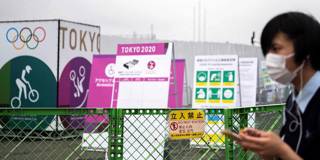Japan's new state of emergency declaration in response to COVID-19 concerns has eliminated any remaining hope for a “normal” Olympic/Paralympic Games in Tokyo this summer. Whether it will also bear on Prime Minister Yoshihide Suga's political prospects this fall remains to be seen.
TOKYO – On July 8, the Japanese government declared a state of emergency in Tokyo until August 22, owing to the COVID-19 pandemic. That means the Tokyo Olympic Games (July 23-August 8) will be subject to strict limits on spectators for large events.
The new restrictions doubtless come as a disappointment to Japanese Prime Minister Yoshihide Suga, who has been eager to showcase the Games as a symbol of Japan’s ability to overcome the difficulties it has faced since the 2011 earthquake and Fukushima nuclear disaster. There now will be no roaring cheers at any of the races or other larger competitions. The festive mood in Tokyo has quickly evaporated, as has any hope of a boost to the local economy.
True, a state of emergency in Japan is much softer than the lockdowns imposed in many Western countries over the past 16 months. People can still carry on with an almost-normal life of shopping and eating out, albeit with more restrictions on restaurants and large retailers’ hours of operation. But this is the fourth declaration of a pandemic state of emergency in Tokyo since April 2020, and restrictions on serving alcohol in restaurants have been added since the last one, because loud conversations without masks are a suspected source COVID-19 cluster spreading.

TOKYO – On July 8, the Japanese government declared a state of emergency in Tokyo until August 22, owing to the COVID-19 pandemic. That means the Tokyo Olympic Games (July 23-August 8) will be subject to strict limits on spectators for large events.
The new restrictions doubtless come as a disappointment to Japanese Prime Minister Yoshihide Suga, who has been eager to showcase the Games as a symbol of Japan’s ability to overcome the difficulties it has faced since the 2011 earthquake and Fukushima nuclear disaster. There now will be no roaring cheers at any of the races or other larger competitions. The festive mood in Tokyo has quickly evaporated, as has any hope of a boost to the local economy.
True, a state of emergency in Japan is much softer than the lockdowns imposed in many Western countries over the past 16 months. People can still carry on with an almost-normal life of shopping and eating out, albeit with more restrictions on restaurants and large retailers’ hours of operation. But this is the fourth declaration of a pandemic state of emergency in Tokyo since April 2020, and restrictions on serving alcohol in restaurants have been added since the last one, because loud conversations without masks are a suspected source COVID-19 cluster spreading.